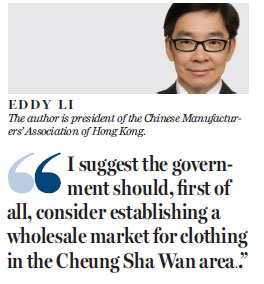Voice getting louder for a fashion wholesale market
Updated: 2016-03-07 08:28
By Eddy Li(HK Edition)
|
|||||||
As a businessman, I naturally paid considerable attention to the economic policies unveiled by Financial Secretary John Tsang Chun-wah in his 2016-17 Budget. Now, I want to focus specifically on Hong Kong's fashion industry.
The financial secretary devoted a whole chapter of his latest Budget to the topic of "Fashion and Design", in which he promised to implement three proposals made by the Advisory Group on Implementation of Fashion Initiatives. This is to help promote local designers and fashion brands in local as well as overseas markets. The financial chief also pledged to launch the third phase of the Design Incubation Programme. This will subsidize designers of 10 emerging local fashion brands to participate in Paris Fashion Week, organize fashion shows for Hong Kong designers in New York Fashion Week and launch a series of activities in the latter half of 2016.
If you look at the history of manufacturing in Hong Kong, from the very beginning the clothing industry, including textiles and garments, was in a dominant position over all other manufacturing businesses. This provided Hong Kong with a solid base to develop its fashion industry. Over the years we have seen some local brands gaining an international profile. According to the Census and Statistics Department, the city's monthly garment and accessories exports are valued at approximately HK$14 billion. This suggests the industry remains a major manufacturing sector in Hong Kong.
But it is noticeable that most of these products are low-end goods and lack both brand effect and economic benefits. Thus, how Hong Kong's clothing brands can achieve greater popularity has been of long-standing concern to industry players as well as relevant government departments. After the financial chief delivered his latest budget speech, I believe many players in the industry now feel a bit relieved. Design is the soul of a product, a brand and even the whole fashion industry. Recent years have seen the success of South Korea in this area. Dongdaemun Design Plaza is a perfect case, demonstrating how supportive the South Korean government has been to its fashion industry. I visited this tourist attraction last month and found it very inspiring and a good reference point for Hong Kong. It holds regular fashion shows for South Korean designers to showcase their talents and creativity. It turns out that many customers are more than willing to purchase these unique pieces after watching the shows.
While it is delightful to see the Budget giving a fresh impetus to cultivating designers, which is very important for the industry, I think there are other things we should pay more attention to. In order to further develop the clothing industry, we need to establish a wholesale sector for its products. The idea is totally feasible; the Cheung Sha Wan area is already an embryonic model of a wholesale clothing market.
We have learnt from many projections and analyses that 2016 is going to be a tough year for the economy. The tourism and retail industries are likely to suffer the most. If the government can take the lead in developing a Hong Kong version of Dongdaemun, then some fresh blood will be injected into the economy. This will benefit many sectors, companies, employers and employees. It is estimated that the establishment of a wholesale market for clothes will lead to a 20 percent increase in garment exports. This is equivalent to an extra HK$3 billion in export revenue every month (based on the current monthly export values of HK$14 billion). What is more, tens of thousands of new jobs will be created.
It was a pledge in Chief Executive Leung Chun-ying's political platform that the government take steps to promote wholesale businesses. But in the latter phase of his administration, sadly, we have not seen any substantial progress in this regard. Hong Kong has no foreign exchange controls, no value-added tax for goods, no import or export restrictions for general products; it has extremely efficient transport facilities, a transparent legal system and a fine reputation for doing business. All of these are great advantages when it comes to developing the wholesale industry.
I suggest the government should, first of all, consider establishing a wholesale market for clothing in the Cheung Sha Wan area. Voices within the industry supporting this idea are becoming louder. The area is now a dispatch center for garments, with ample industrial buildings which serve as an operating base for the wholesale market, providing sufficient space for production, exhibition and distribution.

(HK Edition 03/07/2016 page9)